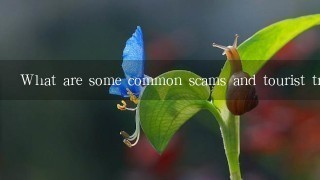What are some common scams and tourist traps to avoid?

Scam:
- Phishing scams: Scammers send emails or text messages that look like they're from a legitimate source, such as a bank or travel agency. They trick you into revealing your personal and financial information.
- Romance scams: Scammers use online dating or social media to connect with potential victims and then exploit them for financial or emotional gain.
- Counterfeiting scams: Counterfeiters create fake goods, such as designer clothing, electronics, or travel documents, and then sell them to tourists.
- Scam tours: These tours promise to take you on an adventure or vacation, but they never materialize.
- Fake excursions: Scammers offer to take you on excursions or tours that are not legitimate.
Tourist trap:
- Overpriced souvenirs: Be wary of souvenirs that are priced much higher than their value.
- Fake money: Never exchange money for a lower price, and be careful of people offering to buy your valuables for cash.
- Overcrowded and overheated attractions: Avoid tourist traps that are overcrowded or too hot.
- Fake hotels and rentals: Do your research before booking a hotel or rental.
- Rental scams: Be careful of companies that offer to rent you a car or other vehicle for a low price, and make sure you understand the terms of the rental before you sign anything.
Tips for avoiding scams and tourist traps:
- Be cautious of unsolicited offers.
- Do your research before you book anything.
- Be aware of the signs of a scam.
- Report any suspicious activity to the authorities.
- Use a reputable credit card.
-
Protect your personal and financial information.





































































